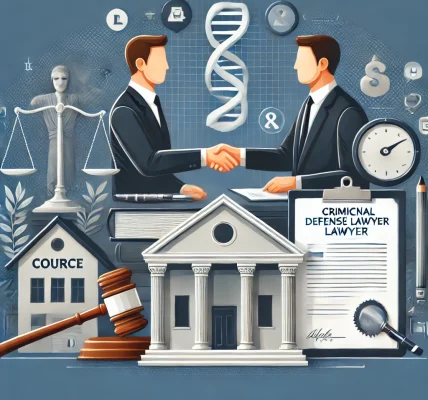Facing false criminal accusations can be a terrifying and stressful experience. Whether it’s a case of mistaken identity, malicious intent, or misinterpretation of events, being wrongly accused can have severe consequences on your reputation, career, and personal life. Understanding how to defend yourself legally and strategically is crucial in such situations.
In this guide, we’ll explore how to defend yourself against false criminal accusations, the legal rights you have, and the steps to protect yourself from legal trouble.
Understanding False Criminal Accusations
False accusations occur when an individual is wrongly charged or blamed for a crime they did not commit. These accusations can arise due to:
- Misunderstandings – When actions are misinterpreted.
- Revenge or Malicious Intent – Someone falsely accuses you to harm your reputation.
- Mistaken Identity – Authorities confuse you with someone else.
- Faulty Evidence – Inaccurate witness statements, fabricated evidence, or errors in law enforcement investigations.
- Emotional Disputes – False claims often arise in family disputes, divorce cases, or workplace conflicts.
If you find yourself accused of a crime you did not commit, the following strategic legal steps can help safeguard your freedom and reputation.
Step 1: Stay Calm and Avoid Confrontation
Your first reaction may be anger, frustration, or panic, but staying calm is critical. Reacting emotionally could make the situation worse or be misinterpreted as an admission of guilt.
- Do not confront the accuser – This could escalate the situation or be used against you in court.
- Avoid public statements – Do not post on social media, as your words could be used as evidence.
- Remain silent with authorities – Anything you say can be used against you. Politely exercise your right to remain silent.
Step 2: Hire an Experienced Criminal Defense Attorney
One of the most crucial steps is hiring a skilled criminal defense lawyer who can guide you through the legal process and protect your rights.
- Find a lawyer who specializes in false accusations.
- Discuss the situation honestly with your attorney.
- Follow their legal advice to avoid making mistakes.
A competent attorney can investigate the case, challenge the evidence, and present a strong defense on your behalf.
Step 3: Gather Evidence to Prove Your Innocence
Building a strong defense requires collecting evidence that supports your innocence. Some useful types of evidence include:
- Alibi Evidence – Proof that you were not at the crime scene (e.g., CCTV footage, phone records, or witness statements).
- Digital Evidence – Emails, texts, call logs, or social media posts that contradict the accusation.
- Witness Testimonies – Statements from people who can confirm your whereabouts or actions.
- Character References – Letters from employers, colleagues, or community members vouching for your integrity.
- Medical or Psychological Reports – If the accusation involves a physical altercation, medical records can disprove injuries or false claims.
Your lawyer will use this evidence to challenge the case against you.
Step 4: Avoid Self-Incrimination
Anything you say or do can be used against you. Be careful to:
- Do not speak to law enforcement without a lawyer present.
- Avoid discussing the case with friends or family who could be subpoenaed.
- Do not sign any documents without legal advice.
- Stay off social media – Even innocent posts can be misinterpreted.
Step 5: Identify Any Motives Behind the False Accusation
Understanding why someone might falsely accuse you can help build a strong defense. Some possible motives include:
- Personal revenge or jealousy
- Financial gain (e.g., lawsuits, insurance fraud)
- Legal advantages in divorce or custody cases
- Political or professional competition
Your lawyer may use these motives to expose the credibility issues of the accuser.
Step 6: Challenge the Prosecution’s Evidence
The prosecution must prove guilt beyond a reasonable doubt. Your defense attorney can:
- Question unreliable witnesses – Cross-examine witnesses for inconsistencies.
- Challenge forensic evidence – Request an independent analysis.
- Expose procedural errors – If law enforcement violated your rights (e.g., illegal search and seizure), evidence could be dismissed.
Step 7: Build a Strong Legal Defense Strategy
Depending on the nature of the accusation, different legal defenses can be used:
- Mistaken Identity – Proving you were not at the scene.
- Alibi Defense – Providing proof of your whereabouts.
- Fabrication or False Allegation – Demonstrating the accuser’s intent to mislead.
- Violation of Rights – If police misconduct occurred, your lawyer may move to dismiss the case.
Step 8: Be Prepared for Trial (If Necessary)
If your case goes to trial, be prepared for the legal proceedings:
- Work closely with your attorney to prepare for court.
- Understand the trial process – jury selection, witness testimony, cross-examinations, and verdict deliberations.
- Maintain professionalism in court – Your demeanor can influence how the judge or jury perceives you.
If the evidence is strong, your lawyer may negotiate a dismissal before trial.
Step 9: Protect Your Reputation
False accusations can damage your personal and professional reputation. Steps to restore your image include:
- Clearing your criminal record (if applicable).
- Public statements (after legal clearance) to refute false claims.
- Professional and social reputation management – Seeking legal recourse for defamation if the false accusations caused reputational damage.
Step 10: Consider Legal Action Against the Accuser
If you were falsely accused, you may have grounds for legal action against the accuser, such as:
- Defamation Lawsuit – If their false claims damaged your reputation.
- Malicious Prosecution Claim – If they knowingly filed false charges.
- False Reporting Charges – If they misled law enforcement.
Consult your attorney to determine if pursuing legal action is the right step.
Final Thoughts
Facing false criminal accusations is a distressing experience, but knowing your rights and taking the right legal steps can help you protect your freedom and reputation. Hiring a qualified defense attorney, gathering strong evidence, and remaining cautious with your statements are key steps to ensuring justice prevails.
If you or someone you know is facing false allegations, seek immediate legal assistance to navigate the situation effectively.
SEO Optimization in This Blog:
✅ Primary Keywords: False criminal accusations, legal defense strategies, wrongful accusations, protecting your rights, hiring a criminal defense attorney.
✅ Engaging Structure: Bullet points, step-by-step guide, legal tips for easy reading.
✅ Legally Neutral Content: Provides lawful self-defense strategies without legal liability.
✅ Actionable Advice: Helps readers take the right legal steps.




